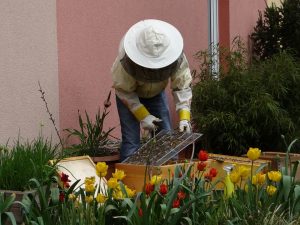Bees are essential pollinators that ensure our being able to grow fruits, vegetables, and flowers — yet bee populations have been decreasing over time. In response, beekeeping is steadily growing in popularity in Colorado, while many others are gardening with native plants to attract bees.
 If you are a beekeeper or are interested in becoming one, or if you are looking for information on the status of bees and beekeeping in Colorado, the Colorado Department of Agriculture’s Apiary Program has a number of resources on their webpage. Among them are the results of a recent honey bee health survey, which can be viewed here.
If you are a beekeeper or are interested in becoming one, or if you are looking for information on the status of bees and beekeeping in Colorado, the Colorado Department of Agriculture’s Apiary Program has a number of resources on their webpage. Among them are the results of a recent honey bee health survey, which can be viewed here.
The University of Colorado Museum of Natural History also has a number of bee studies available on their website, including The Bees of Colorado; and the Colorado State University Extension has recently issued a booklet Integrated Hive Management for Colorado Beekeepers.
Also be sure to check out Beekeeping in the Intermountain Region and Building a Secure Beehive Enclosure from our library.
Finally, for a historical perspective on Colorado beekeeping, see Report of Experiments in Apiary (1887); Apiary Experiments (1900); Beekeeping in Colorado (1922) and Introduction to Beekeeping (1934).
Photo courtesy http://maxpixel.freegreatpicture.com/Bees-Honey-Human-Honey-Bees-Beehive-Beekeeper-970216
- How to Spot the Differences Between Eagles and Hawks - August 16, 2021
- How Transportation Projects Help Tell the Story of Colorado’s Past - August 9, 2021
- Time Machine Tuesday: The Night the Castlewood Canyon Dam Gave Way - August 3, 2021